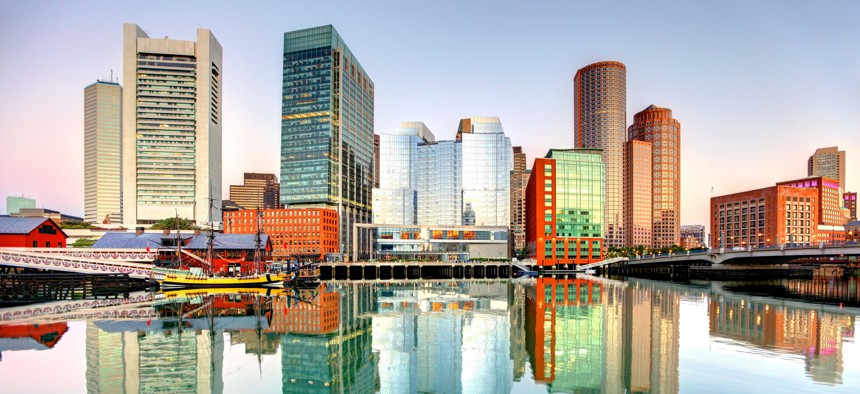How Mayors Are Thinking About Prioritizing Federal Aid

A view of Boston. iStock.com/DenisTangneyJr
Nearly 80% of mayors responding to a new survey said American Rescue Plan Act funding would help their cities accomplish goals related to homelessness and infrastructure, among other areas.
Homelessness, transportation infrastructure and social spending programs are among the areas U.S. mayors see opportunities to spend the federal aid going to their cities under the American Rescue Plan Act, according to a new survey.
The latest edition of the annual Menino Survey of Mayors, from the Boston University Initiative on Cities and its partners, includes responses from 126 mayors in cities with at least 75,000 residents. It queried the city executives on a number of issues, but one of them was the American Rescue Plan Act, the federal pandemic relief law that's sending $350 billion in direct aid to states and local governments.
Seventy-eight percent of the mayors said that funding will enable them to accomplish "transformative" goals, while only 1% said they saw little fiscal benefit from it.
Asked specifically to name up to two transformative areas that they wanted to focus their ARPA spending on, 21% of respondents said addressing homelessness, 18% transportation infrastructure, 15% social services, 15% housing and 13% answered either small business, municipal facilities, equity focused programs or broadband.
About $65 billion of the money under ARPA's primary state and local government aid program went to cities or smaller local governments, dubbed "non-entitlement units."
Another area the researchers asked about: What long-term implications of the pandemic mayors were most worried about? Here about half said residents' "mental health or trauma," 37% said learning loss among young people, and roughly a third said financial insecurity among low-income residents or small business closures.
For more details from the mayors survey click here.
A report on the findings cautions that many of the survey interviews took place over the summer, before the virus' delta variant spread in full force. The timing could have skewed how some mayors responded compared to how they're viewing certain topics currently.
"As the pandemic and government response have evolved, we’re seeing mayors focusing on potential long-term and persistent impacts, and the ways the pandemic has changed their residents, and at the same time, we’re also seeing them focusing on making long-term investments," said David Glick, a co-author of the survey and political science professor at Boston University.
Data Collection on Race and Ethnicity
The survey also looked at issues around how the mayors' cities gather and break down data by race and ethnicity, with the report pointing out that many city officials view high-quality data as a key for making sound policy decisions.
Here, fewer than 25% of respondents said that their cities were collecting data based on race and ethnicity for climate resilience planning—this would generally be for programs to help cities better withstand severe weather and the effects of climate change, like sea level rise and hotter temperatures.
The share of mayors who said their cities collect race and ethnicity data in areas like K-12 school student performance, public housing, homelessness and small businesses was in the 50%-60% range. For arrests, it was around 75%.
Just over half of the mayors said that federal data reporting requirements are either "very" or "extremely" important for driving the race and ethnicity data that their cities collect.
The report notes that the Biden administration has launched efforts aimed at expanding the number of federal datasets that are disaggregated by race and ethnicity, along with other demographic variables, like gender, veteran status and disability.
Bill Lucia is a senior editor for Route Fifty and is based in Olympia, Washington.
NEXT STORY: State Lawmakers' Anti-Vaccine Efforts May Prove Mostly Symbolic






